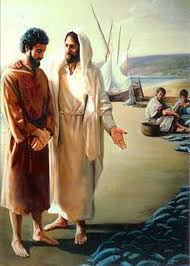HOMILY SUNDAY EASTER 3 – C 2022
Witnessing to the Resurrection
(Acts 5:27-30, 40-41; Psalm 30; Rev 5:11-14; Jn 21:1-19)
**********************************************************
How often do you tell others that you love them?
Let God’s forgiving love transform you into a disciple whose holiness and loving service bears witness to the resurrection.
Imagine you had good idea to start small business with a group of friends who all agreed to this common venture. One betrays you and sells the idea to a competitor; another becomes afraid of the initial cost, lies about his investment and denies he is even associated with you, while all the others bail out of the plan and leave you on your own.
 How would you respond? Imagine this – you would invite them all out for a special seafood supper at your favourite restaurant, present them with the keys to their offices in the new headquarters of the business, and name the fearful one CEO.
How would you respond? Imagine this – you would invite them all out for a special seafood supper at your favourite restaurant, present them with the keys to their offices in the new headquarters of the business, and name the fearful one CEO.
This scenario gives you an idea of what is happening in the gospel, how Jesus reacts to his friends’ behaviour towards him – a meal that means reconciliation through his forgiveness, a meal that transforms them. This is Eucharistic faith, faith in Jesus. We too are forgiven, and sent out now to forgive others and spread the Good News of God’s love through loving, humble service.
All the Easter appearances are stories of transformation. Mary Magdalene moves from a woman who is weeping, mourning and clinging to grief, to one who confidently announces to the apostles that she has seen the Lord; Thomas moves from one who doubts to one who first proclaims the early Kerygma “My Lord and my God;” the disciples of Emmaus move from fear and flight, to faith and courage; the disciples in the upper room move from fear and sadness, to peace and joy, and Peter and the apostles in the first reading boldly confront the religious authorities, refuse to be intimidated and actually rejoice at having the honour to suffer for the sake of the name of Jesus.
The key to this new life is to die to our old selves through faith in the love and forgiveness of God made visible in Jesus Christ. The first reading is very clear: receive salvation through repentance and the forgiveness of sins. The gospel today shows Peter in a process of transformation. The old Peter who was so sinful, brash, who tried to block the cross, who denied knowing Jesus, is dying. A new Peter is being born, through forgiveness. The three affirmations of Jesus counter-balance the three times he denied even knowing Jesus.
St. Bishop Eugene de Mazenod, founder of the Missionary Oblates of Mary Immaculate, was himself transformed by the love of Christ one Good Friday. As he gazed at the feet of Jesus on the cross during a Good Friday service, he was suddenly moved to tears by the love of God made visible in Jesus. He became acutely aware of all the ways he had himself denied and betrayed Jesus as a young wilful person, repented deeply, changed his life, became a priest, then a bishop and eventually founded a religious congregation.
His principle of action as founder was to advise his members to help people become more fully human, then Christian, and then saints. He outlined for the members of his community steps toward holiness for themselves. They are:
- Interiority
- Presence of God by experiencing God’s love within one’s self
- Become united, one with God, through prayer
- Transformation of one’s personality
- Going forth to serve others, like Peter in the gospel.
It is noteworthy that Jesus’ commission to Peter in this story, both to feed his sheep and to follow him, are grounded in and derive from Peter’s love of Jesus. It is in the post-resurrection community’s love for Jesus that he continues to be fully known. To love Jesus is to know Jesus, because, as Jesus’ words to Peter make clear, to love Jesus is to shape one’s life according to Jesus’ life.
Holiness is our call today, our way of shaping our lives according to Jesus’ life. We need not be miracle workers or martyrs, but we are called to be saints through desiring and striving for holiness. The real miracle is our own transformation. That transformation can be compared to a martyrdom in slow motion, as we embark on an inward journey of humble self-knowledge, repentance, receiving God’s forgiveness, and healing of our defects of character. We then emerge as transformed disciples of Jesus who can proclaim like Mary Magdalene, “We have seen the Lord.” We are to be the witnesses to the resurrection ourselves.
The Eucharist is an experience of Easter: in faith, we are forgiven and healed in this meal. Just as Jesus’ ministry was inaugurated with a miracle of unprecedented abundance, so too is the Church’s ministry. John 21:1-14 is thus a story of celebration for the post-resurrection community, because it demonstrates for the community that its life is grounded in an experience of God’s fullness and unprecedented, unexpected gift.
So, let God’s forgiving love transform you into a disciple whose holiness and loving service bears witness to the resurrection.



